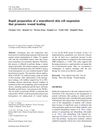1 citations,
January 2024 in “International journal of molecular sciences” TRPV4 helps cells repair tissue and reduce scarring by controlling calcium levels.
31 citations,
September 2012 in “Journal of biological chemistry/The Journal of biological chemistry” The right amount of retinoic acid is essential for normal hair growth and development.
 16 citations,
December 2018 in “Plant Science”
16 citations,
December 2018 in “Plant Science” Elevated CO2 can lessen the negative impact of water shortage on soybean roots and affects specific genes.
 53 citations,
May 1986 in “Clinics in endocrinology and metabolism”
53 citations,
May 1986 in “Clinics in endocrinology and metabolism” Androgens like testosterone affect hair growth and oil production differently across body parts and individuals.
 1 citations,
January 2024 in “Theranostics”
1 citations,
January 2024 in “Theranostics” Exosomes show promise for future tissue regeneration.
 147 citations,
November 2020 in “International Journal of Molecular Sciences”
147 citations,
November 2020 in “International Journal of Molecular Sciences” Keratinocytes help heal skin wounds by interacting with immune cells and producing substances that kill pathogens.
 5 citations,
March 2017 in “Cell and Tissue Banking”
5 citations,
March 2017 in “Cell and Tissue Banking” Researchers developed a new method to quickly prepare skin cells that improve wound healing in rats.
 87 citations,
March 2014 in “Biochimica et Biophysica Acta (BBA) - Molecular and Cell Biology of Lipids”
87 citations,
March 2014 in “Biochimica et Biophysica Acta (BBA) - Molecular and Cell Biology of Lipids” Cholesterol sulfate buildup due to a genetic mutation disrupts the skin barrier, leading to the scaling skin seen in X-linked ichthyosis.
 28 citations,
December 2018 in “Plant, cell & environment/Plant, cell and environment”
28 citations,
December 2018 in “Plant, cell & environment/Plant, cell and environment” A protein called PLC2 is important for the growth and development of plant roots influenced by auxin.
 1 citations,
March 2024 in “Signal transduction and targeted therapy”
1 citations,
March 2024 in “Signal transduction and targeted therapy” NF-κB signaling is crucial in many diseases and can be targeted for new treatments.

Low-level laser therapy combined with Neoptide improved hair regrowth better than either treatment alone in rats.
 11 citations,
December 2014 in “The American journal of pathology”
11 citations,
December 2014 in “The American journal of pathology” A gene deletion in mice causes weak protein, immune issues, hair loss, airway problems, and wasting disease.
 October 2023 in “bioRxiv (Cold Spring Harbor Laboratory)”
October 2023 in “bioRxiv (Cold Spring Harbor Laboratory)” Blocking both main energy pathways can stop hair follicle stem cell-induced skin cancer growth.
 10 citations,
May 2020 in “Dermatology Research and Practice”
10 citations,
May 2020 in “Dermatology Research and Practice” Proteoglycans are important for hair growth, and a specific treatment can help reduce hair loss.
 70 citations,
November 1984 in “Cell & tissue research/Cell and tissue research”
70 citations,
November 1984 in “Cell & tissue research/Cell and tissue research” Vitamin D3 affects cell differentiation in specific skin areas.
 2 citations,
July 2007 in “Cancer biology & therapy”
2 citations,
July 2007 in “Cancer biology & therapy” Bexxar is highly effective as a first treatment for non-Hodgkin's lymphoma, with most patients alive and many in remission after eight years.
 23 citations,
May 1984 in “Journal of the American Geriatrics Society”
23 citations,
May 1984 in “Journal of the American Geriatrics Society” Benign Prostatic Hyperplasia may be caused by changes in how the body processes male hormones.
 1 citations,
October 2016 in “Iranian journal of psychiatry and behavioral sciences”
1 citations,
October 2016 in “Iranian journal of psychiatry and behavioral sciences” Sertraline, an antidepressant, may rarely cause hair loss.
 January 2025 in “Medicina”
January 2025 in “Medicina” Advanced techniques and technologies can improve burn wound healing, but more research is needed.
 6 citations,
June 2021 in “Developmental biology”
6 citations,
June 2021 in “Developmental biology” Dermal EZH2 controls skin cell development and hair growth in mice.
January 2025 in “Pharmaceuticals” Nanocarriers can improve antioxidant delivery to the skin but face safety and production challenges.
277 citations,
February 2013 in “Science Signaling” Mitochondrial reactive oxygen species are essential for skin and hair development.
 3 citations,
October 2010 in “Epilepsy Currents”
3 citations,
October 2010 in “Epilepsy Currents” Altered metabolism can help control seizures by changing brain signaling and energy use, suggesting new treatments for epilepsy.
 522 citations,
January 2001 in “Cancer investigation”
522 citations,
January 2001 in “Cancer investigation” Doxil is an effective, modified chemotherapy drug with a unique toxicity profile and shows promise in treating certain cancers.
 271 citations,
May 2019 in “Cells”
271 citations,
May 2019 in “Cells” The secretome from mesenchymal stem cells is a promising treatment that may repair tissue and avoid side effects of stem cell transplantation.
MFN2 mutations cause mitochondrial problems, leading to more upper body fat and lower leptin levels.
 6 citations,
January 2021 in “International Journal of Molecular Sciences”
6 citations,
January 2021 in “International Journal of Molecular Sciences” Finasteride-treated male rats' offspring had altered glucose metabolism, potentially increasing diabetes risk.
 122 citations,
July 2005 in “The FASEB journal”
122 citations,
July 2005 in “The FASEB journal” Hair follicles produce and respond to melatonin, affecting hair growth and sensitivity to estrogen.

The vitamin D receptor has many roles in the body beyond managing calcium, affecting the immune system, hair growth, muscles, fat, bone marrow, and cancer cells.
MFN2 mutations cause mitochondrial problems, unusual fat distribution, and low leptin despite high body fat.























